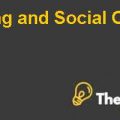
Q3: Do you think Phyllis Warren was unfair in taking advantage of the board’s implied admission of salary discrimination on the basis of sex? Why or why not?
Answer:
The analysis has shown that the demand raised by Ms. Phyllis Warren was entirely unfair from the board’s perspective. The primary reasons behind this statement were Mr. Warren’s false deceptions on her approach towards the board. The gambit plotted by her was not based on any evidences and ingenuousness. In addition to this, she claimed that other employees of the company were in favor of her was completely misleading and there is no truth behind it, in fact; there were many employees who were against the idea proposed by Ms. Warren. The intentions by her were solely backed by getting monetary compensations, rather than giving justice to the women in the firm.
Along with that, she failed to provide any law or legal example to defend her statements. Furthermore, there are many events in which compensations have been offered to the victims and the affected ones. One of the examples of giving compensation was an agreement between the post-world war II Germany and the remnants of the Holocaust. They have received compensation for the dreadful massacre till today. Through these examples, it is evident that Ms. Phyllis was making an attempt to take advantage of the board (Ayres, 1991).
Q4: Do you think Phyllis was wrong in giving the board the impression that her proposal enjoyed broad support? Why or why not?
Answer:
During the board meeting, Ms. Warren gave a presentation in which she asked for the back pay that was based on adjusting the past salaries of women in the firm. Her statement was backed by the impression that she has got a broad support from other employees of the firm. In reality, that was not the actual case. There were some employees who thought they were satisfied and didn’t think they should force the issue. Other employees in the firm think that the firm had been fair in readjusting the salary schedule, and they were willing to let bygones be bygones. Along with this, there were many employees who believe that asking for this extra reimbursements might roll back the board’s favorable decision. During making false impression of pretending a huge support from other coworkers, Ms. Warren herself is the major effected stakeholder as it will make a question mark on her integrity.
Consequently, Ms. Warren pretends in the meeting that she has got support from the majority of the workers in the firm just to make her statements heavier. In reality, it has been just an unhealthy tricked by her to trap the board members. Ms. Warren was completely done wrong with manipulating the opinions of their workers just to defend herself more heavily. In addition, it is ethically wrong to miscommunicate certain activity like the meeting she did with a few other women at lunch.
Q5: If the board rejects the committee’s request, do you think the committee ought to sue? Give reasons.
Answer:
The choice taken by the board members will be based on a thorough research that will provide evidence and support related to the demand raised by Ms. Warren. In addition, the committee members need to analyze the regulations and rules of the organization that is, whether the rules and policies of the company allow them to provide compensation to the employees for previous years or not.
Suppose, after all the analysis the board rejects the request by the committee, there are no such strong points in favor of the committee to go to sue. First, the point raised by the member was valid that the current board is not at all responsible for the acts and decisions made by the previous board members. Additionally, the majority of the employees in the firm were not in the favor of the request made by Ms. Warren even the female employees as well. In the United States, there is a Compensatory Justice Program that demands justice, and states that the firm needs to compensate employees for the damages they had faced with respect to discrimination. But, it is not confirmed that whether the employers are liable for the damages that have been done with the employees by previous employers. Last but not the least, if the board rejects the request of the committee then, it is obvious that the most affected stakeholders will be the members of the committee.
The Major reason behind the rejection of committee’s request might be the concept of egalitarianism that can be defined as treating all the employees in the organization equally. According to this theory, employers are required to treat all the employees with transparency and equality. Giving extra importance to the committee will be an act of injustice to the rest of the employees because the employers have to reduce everyone’s existing reparation to meet what Phyllis termed the board’s compulsion to the past (Kingsolver, 2008)............................
This is just a sample partial case solution. Please place the order on the website to order your own originally done case solution.












